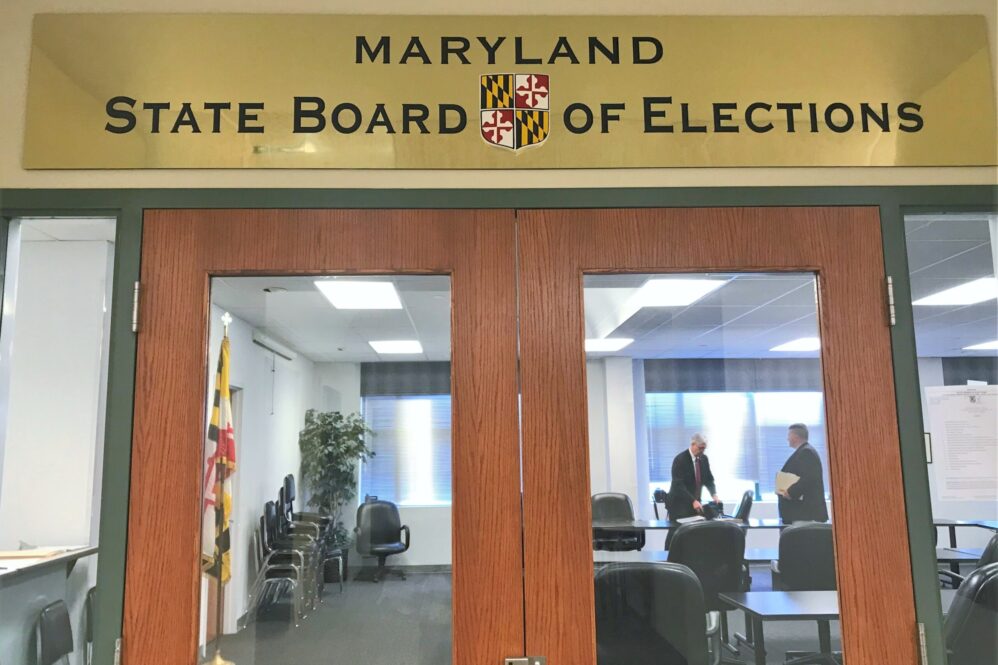MARYLAND MATTERS: Every four years after an election, the Maryland governor makes what seems like routine appointments to the state’s 24 election boards, after seeking nominees from the local central committees of both the Democrat and Republican parties.
For the last 8 years, with Gov. Larry Hogan (R) at the state’s helm, Republicans have held the majority on the local boards, but the new Democratic governor will flip the balance of power on the 24 boards when Gov. Wes Moore (D) makes his picks, giving Democrats the majority on the panels.
Those election board appointments are arguably a fairly arcane responsibility so far as the general public goes, but they are decisions that are mighty important to party operatives and political insiders.
Last Friday, Moore’s Appointments Office sent out e-mails with a quick-turnaround deadline for election board nominees’ names to be sent to the governor just a week later — missives that sent party central committee members scrambling to pull together a list of candidates and get it to the State House in seven days.
Harford County Democrats, however, dug in their heels. Not enough time for the public to respond, they told Moore aides.
Stalemate.
“That was the first we had heard of it from the state, as far as what their time lines were going to be,” said Henry S. “Sandy” Gibbons, chairman of the 10-member Harford County Democratic Central Committee. “We had planned to put this on the agenda this Wednesday, and get the message out … to give us the proper two weeks’ notice.”
Gibbons said it was his understanding that the bylaws of Maryland State Party required the committee give the public two weeks’ notice about applying for a “vacancy” on the election board.
The state party apparently did not believe the two weeks was necessary, though, and also sent out an e-mail Friday urging central committee members around Maryland to hustle the names of nominees to the governor.
Gibbons contacted the state party on Friday and did manage to get the deadline extended to Tues., Jan. 31, but that still was not long enough.
“We were encouraged to do our best, and I went back and said, Look, ‘I need the two weeks required under the bylaws,’” he said.
That led to a series of e-mails back and forth all weekend between Gibbons and the Moore’s appointments office, until finally they two sides agreed that Harford County would get the names to the governor by Feb. 9.
“We pushed our deadline back, and the state has given us the flexibility to do that,” Gibbons said. “We were able to put out a revised deadline today [Monday].”
“I think we’re in a good place now,” he said.
It was unclear why Moore’s appointments office was asking for the hurry-up. The law gives central committees 20 days to get the names of nominees to the governor, and under that limit, there would still be time for the Maryland Senate to advise and consent before adjourning April 10. Besides, state law requires that the incoming election boards be seated specifically in June following the election, which is still months away.
Efforts to reach Tisha S. Edwards, the governor’s appointments secretary, were unsuccessful Monday. A call to her office was referred to the press office, and the press office did not have a response.
Under state law, local election board members are appointed to four-year terms, and in all but two of the state’s 24 jurisdictions the boards consist of five members: Three members from the majority political party — this term the Democrats — and two from the minority party, the GOP for the next four years.
In Prince George’s County, the board is made up of five members and three substitutes. Four members and two substitutes come from the majority party, and one member and one substitute from the minority party.
Montgomery County’s board has seven members: Three members and one substitute are from the majority party, and two members and one substitute are from the minority party.
The president of each board is chosen by the board members.
Each local board of elections is responsible for maintaining voter registration and overseeing elections in that jurisdiction. The local election boards are supervised by the Maryland State Board of Elections in Annapolis.










